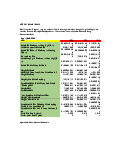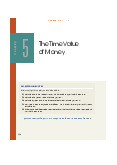



Preview text:
1. T
ell your comments about the group of investors who want to set up the company in
the mentioned case above. 2. T
ell your comments about the property contributed as capital to the company mentioned above.
ABC private enterprise agrees to contribute 3.000.000.000 VND in cash.
According to Clause 4, Article 188 Law on Enterprise 2020, Private enterprises may not
contribute capital for the establishment of, or purchase shares, capital contributions in, a
partnership, limited liability company or joint stock company. Thus, private enterprises do
not have the right to contribute capital to establish other companies, so it is against the law
for ABC company to contribute 3,000,000 VND to establish a limited company.
XYZ Company, a limited liability company with only one member, wants to contribute its
well-known trademark in chocolate producing industry.
According to Clause 3, Article 17 Law on Enterprise 2020, organizations and individuals have
the right to contribute capital, purchase shares, purchase capital contributions to joint-stock
companies, limited liability companies, and partnerships.
=> One-member limited liability company XYZ contributing capital to establish another enterprise is legal.
According to clause 18, article 4 Law on enterprise 2020, capital contribution means the
contribution of assets to make up a company’s charter capital, including capital contribution
for the establishment of a new company or additional contribution of charter capital of an existing company.
According to article 34 Law on enterprise 2020 and clause 1, article 4 of Law on intellectual
property 2005, intellectual property rights used when contributing capital to the charter
capital of an enterprise are rights of an organization or individual to intellectual assets
comprising copyright and copyright-related rights, industrial property rights and rights to plant varieties.
According to clause 4, article 4 Law on intellectual property 2005, industrial property rights
means rights of an organization or individual to inventions, industrial designs, designs of
semi-conducting closed circuits, trade secrets, trademarks, trade names, and geographical
indications which such organization or individual created or owns, and the right to prevent unfair competition.
=> From which it can be seen that the trademarks is also the property of company XYZ, a
limited liability company that can contribute capital to the charter capital of the enterprise.
Mrs. T. who received 200.000 USD from her family in the US want to contribute this amount.
According to clause 18, article 4, Law on enterprise 2020, capital contribution means the
contribution of assets to make up a company’s charter capital, including capital contribution
for the establishment of a new company or additional contribution of charter capital of an existing company.
According to article 34, Law on enterprise 2020, assets contributed as capital shall be in the
form of Vietnam dong, freely convertible foreign currencies, gold, and use rights, intellectual
property rights, technologies, technical know-how, and other assets that can be valued in Vietnam dong.
According to Point dd, Clause 23, Article 4 Law on enterprise 2020, related persons are
individuals or organizations that have direct or indirect relations with the enterprise in the
following cases: Spouse, natural father, natural mother, adoptive father, adoptive mother,
father-in-law, mother-in-law, natural children, adopted children, son-in-law, daughter-in-law,
siblings, brothers-in-law, sisters-in-law of managers of the company , at-law representatives,
Supervisors, member and shareholder holding a controlling capital contribution amount or controlling shares.
=> Mrs. T's capital contribution is money, so it is completely legal. T's capital contribution is
money sent from her family in the US, so it has to be changed into Vietnam dong.
Mr. M. agrees to contribute his land use right.
According to clause 18, article 4, Law on enterprise 2020, capital contribution means the
contribution of assets to make up a company’s charter capital, including capital contribution
for the establishment of a new company or additional contribution of charter capital of an existing company.
According to article 34, Law on enterprise 2020, assets contributed as capital shall be in the
form of Vietnam dong, freely convertible foreign currencies, gold, and use rights, intellectual
property rights, technologies, technical know-how, and other assets that can be valued in Vietnam dong.
According to point a, clause 1, article 35 of the Law on enterprises 2020, for assets with
registered ownership or land use rights, the capital contributor shall carry out the
procedures to transfer the ownership of such assets or the land use rights to the company as
prescribed by laws. The transfer of ownership of assets, land use rights contributed as
capital is not subject to registration fee;
=> Mr. M's capital contribution is the land use right, which is completely legal in accordance
with the law. If Mr. M's property is registered or the value of land use right, then Mr. M must
carry out procedures to transfer property ownership or land use rights to the company at a competent state agency. 3. If you w
ant to set up an enterprise in Vietnam, which type of business organizations
do you choose? Give the explanation.
The business organization I will choose to set up in Vietnam is a private enterprise. A private
enterprise is an enterprise owned by an individual who is liable for all activities of the
enterprise with all his/her assets. The reason I choose this type of business organization is:
-A private enterprise is held by only one person (the business owner), that person has total
authority over all aspects of the company's activities. Because all authority is concentrated
in the owner, the private firm model is particularly simple to organize, as there is no need for
several bureaucratic departments. Without consulting anybody else, the business owner is
entirely involved in purchasing, selling, transferring, or dissolving the firm.
-The rights and obligations of a private business are constantly tied to the owner, it is simple
for business owners to leverage their personal reputation to build confidence among
consumers and business partners.
-There is no distinction between the assets of the business and the assets of the individual
(business owner), borrowing money from a bank or other credit institution is simple for a private enterprise.
-In general, this is the sort of firm that faces the fewest legal restrictions.
How ever this type of business organization also have a disadvantage:
Because a private enterprise has no legal status, there is no separation between the
property of the business owner (individual) and the property of the business, which means
the business owner is personally liable for all liabilities corporate indebtedness. This implies
that if debts arise but the private enterprise's assets are insufficient to satisfy the bill, the
business owner must put all assets under his/her personal ownership to fulfill the debt payback requirement. 4. If someone in your c
ompany has Covid-19 in Vietnam, which benefits can he/she get
from their insurances? Give the explanation.
-Law on Social Insurance:
According to Points a and b, Clause 1, Article 2 of the Law on Social Insurance, social
insurance applies to: People working under labor contracts with indefinite term, labor
contracts with definite term, labor contracts seasonal workers or according to a certain job
with a term from full 3 months to less than 12 months, including the labor contract signed
between the employer and the legal representative of the person under the age of 15
according to the provisions of the labor law. Persons working under labor contracts with a
term from full 1 month to less than 3 months.
According to Clause 1, Article 4 of the Law on Social Insurance, Compulsory Social Insurance
has the following regimes: Sickness, Maternity, Occupational Accident, Occupational
Disease, Pension, Survivorship benefits.
=> So people in private enterprises with Covid-19 will benefit from compulsory social insurance.
The period of enjoying sickness benefits, according to Point a, Clause 1, Article 26 of the Law
on Social Insurance, For employees working under normal conditions, this period is 30 days,
if they have paid social insurance premiums for under 15 years; 40 days, if they have paid
social insurance premiums for between full 15 years and under 30 years; or 60 days, if they
have paid social insurance premiums for full 30 years or more.
=>The employee is entitled to the relevant number of sick days based on the duration of premium payment.
Employees entitled to the sickness regime prescribed in Clause 1, or at Point a, Clause 2,
Article 26, or in Article 27, of this Law are entitled to a monthly allowance equal to 75% of
the salary of the month preceding their leave. An employee who has just started working or
who previously paid social insurance premiums and then ceased working for a certain time is
entitled to an allowance equal to 75% of the salary of that month on which social insurance premiums are based.
-Law on Health Insurance:
According to article 12, Law on Health Insurance 2008, amended and supplemented in 2014,
laborers working under indefinite-term labor contracts or labor contracts of full three-month
or longer term according to the labor law; business managers who enjoy salaries or
remunerations under the salary and remuneration law; cadres, civil servants, and employees
prescribed by law (below collectively referred to as employees).
According to Article 21.1 of the Law on Health Insurance 2008, amended and supplemented
in 2014, health insurance provides the main benefit of costs of medical examination and
treatment, function rehabilitation. 5. Accordin
g to Vietnamese law, what are the advantages or disadvantages of dispute
settlement by arbitration and court between your company and XYZ Company in the
mentioned case above (if any)?




